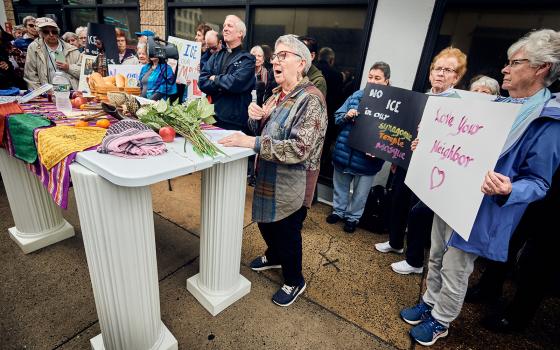
Bishop Mark Seitz, center with microphone, with Cardinal Joseph Tobin, left, and Pastor Omar Coronado, right, during an interfaith gathering presented by the Archdiocese of Newark and Faith in Action at St. Lucy’s Catholic Church, Jan. 13, 2025, in Newark, N.J. (Archdiocese of Newark/Sean Quinn and Maria Margiotta)
Back in November, just a week after Donald Trump was elected to a second term as U.S. president, Bishop Mark Seitz of El Paso, Texas, chair of the U.S. Catholic bishops’ committee on migration, said the bishops would be cautious not to overreact to Trump’s immigration promises, as "the reality is different from the rhetoric."
Now, one week ahead of Trump’s inauguration, after the administration has said it will cast aside a restriction on Immigration and Customs Enforcement raids on sensitive spaces, including houses of worship, and after Customs and Border Patrol conducted a large-scale raid near Bakersfield, California, Seitz is taking a more urgent tone.
"We are at risk of losing part of our soul as a nation, so this is a time of great concern," Seitz told RNS, saying immigration policy must acknowledge the importance of fundamental human dignity and inalienable rights.
Seitz, like many immigration observers, believes the Bakersfield area raid foreshadows the types of raids that might take place under the Trump administration, which made mass deportations a cornerstone of Trump’s campaign promises.
On Monday (Jan. 13), Seitz traveled to Newark, New Jersey, to join Cardinal Joseph Tobin, his archdiocese and Faith in Action, a multifaith community organizing group, at St. Lucy’s Catholic Church for a day of prayer and dialogue with immigrant families. After the event, Seitz went to visit the Statue of Liberty, which has "great meaning" for him, especially now, he told RNS en route.
Bishop Dwayne Royster, a United Church of Christ minister and the executive director of Faith in Action, said that beyond the Catholic bishops, there were faith leaders from the United Church of Christ, as well as Jewish and Muslim leaders. In addition to Tobin and Seitz representing Catholic prelates, auxiliary bishops from Newark, and New Jersey bishops from Camden, Metuchen and Paterson were all present.
The Faith in Action leader said the presence of many different faith leaders together was meant to send a strong message against mass deportations, that "we’re going to do everything within our power to prevent this from happening."
Royster said the leaders also meant to convey to the decision-makers in government who are pushing mass deportation policies: "If you’re a person of faith, you are operating contrary to the will of God."
The Rev. Stephen Ray Jr., former president of Chicago Theological Seminary and senior minister at United Church on the Green in New Haven, Connecticut, who spoke at the event, told RNS he felt it was important to engage in interfaith action because "an entire part of the way that this is being weaponized against people who are very vulnerable is presented as if deportations, etc., are somehow some sort of Christian response."
"It’s important to show a picture of people of goodwill across religious traditions, that we stand together for the best society," Ray said.
Advertisement
Seitz told RNS that a critical element of the event was listening to immigrants themselves, and he, Royster and Ray all said they were moved by the testimonies of immigrants who are now fearing deportation under the Trump administration’s proposed policies.
"One of the things that makes one most fearful is being alone in times of trial," said Seitz. "That’s one of the things the church certainly can do is to be present to people who might otherwise feel forgotten."
In his speech at the event, Tobin said: "We’re deeply concerned about the potential impact of mass deportation on children and families. Within the Catholic tradition and other faith expressions represented here today, we’re able to see the humanity in everyone."
Tobin said faith communities could show their love to immigrants through four actions: encounter, a Catholic term involving listening, accompaniment, prayer and advocacy.
Royster, who also leads a religious order called the Society for Faith and Justice, highlighted that not only houses of worship, but also schools and hospitals, which had previously had some protection from ICE raids, often have ties to religious traditions.
"The interruption of the government is actually invading religious liberty when they invade those spaces," Royster told RNS of the proposed change in ICE raid policy. "We ought to be able to minister to those who are sick, those that need education, those who are seeking to have deeper connection."
In his prepared remarks, Seitz also spoke to the importance of those spaces. "It is to sanctuaries like this one, to churches and temples and holy places like this one that the community comes to be formed into a people," he said in a speech that warned against the division created by fear and unjust laws.
"When the law is used to divide, to instill fear, to separate, this is not good law. This is not humane law. This is not just law. To elected officials I say, mass deportations are not good law," he said.
Seitz added a caveat that has been part of his rhetoric, especially in recent months. "We do not oppose legitimate law enforcement actions against those who would threaten the safety and security of our families and our communities with violence," he said.
But, he made clear, "in the face of tactics of intimidation and division, the Catholic Church will work to protect our families, to witness to human dignity, to defend our religious liberty, to oppose the shutting down of our borders and our hearts, to march and work for immigration reform and good laws, to pour cool water on embers of hate, to preach the good news."






